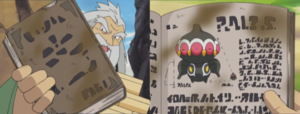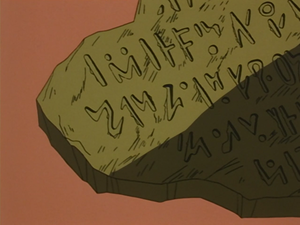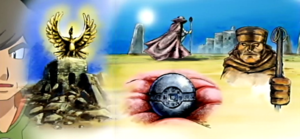History of Poké Balls
The development of Poké Balls has gone through a number of stages, as evidenced by the ancient and historical variants of the modern Poké Ball that have been seen in the anime.
Ancient history
Pokémopolis
When Dr. Eve was exploring the ruins of Pokémopolis during The Ancient Puzzle of Pokémopolis, she discovered a number of old artifacts. A handful of these relics contained ancient, giant Pokémon, and so can be seen as forerunners to the contemporary Poké Ball. These objects were named by a stone tablet that had inscribed on it the legend of Pokémopolis. The "Unearthly Urn" and accompanying spoon contained a giant Alakazam, which, to activate, one had to insert the spoon into the Urn. It appeared that the Alakazam could do this autonomously from within the Urn using its psychic powers. The "Dark Device" contained a giant Gengar. It is unknown what initiated its release. Finally, the giant paintbrush/bell that was discovered contained a giant Jigglypuff, and was activated by the song of a regular-sized Jigglypuff.
Unearthly Urn, containing the giant Alakazam
The Dark Device, containing a giant Gengar
The paintbrush/bell containing the giant Jigglypuff
Pokélantis
A relic that looks very similar to a contemporary Poké Ball was discovered in the tomb of the King of Pokélantis. It was revealed during the course of Battling the Enemy Within! that it contained the spirit of the King, possibly indicating an alternate use for Poké Balls in ancient times. It was erroneously rumored that the orb contained a Ho-Oh, which would have made it much more similar to a modern Poké Ball.
The orb found in the King's tomb
Recent history
Sir Aaron's staff
Featured in Lucario and the Mystery of Mew, the crystal in Sir Aaron's staff was used "hundreds of years ago" to contain his apprentice Lucario. This can be seen as a forerunner to the contemporary Poké Ball. The ubiquitous Poké Ball design can be seen in other places in the beginning of the movie, but it is unknown what they relate to.
Giant stone Poké Ball

A giant stone Poké Ball was said in Claydol Big and Tall to have been created "in olden times" by the White Sage to contain a rampaging giant Claydol which had escaped from an identical stone Poké Ball. It was also said in this episode that this event was contemporaneous with the first creation of Claydol, which is cited as taking place around 20,000 years ago. However, this was read by Sigourney from an "ancient text" that he had a lot of trouble translating earlier in the episode.
The Odd Keystone
The Odd Keystone can be seen as a Poké Ball forerunner, in that it was used to capture a Pokémon 500 years ago. In The Keystone Pops! an old woman reveals that Spiritomb was defeated and imprisoned by an Aura Guardian. The method and reason for the confinement are currently unknown.
The Odd Keystone
The Aura Guardian who defeated Spiritomb
The Captain's Poké Balls
In A Shipful of Shivers, it was revealed that the Captain kept his Haunter and Gastly inside contemporary looking Poké Balls, approximately 300 years before the present. The old Orange League Winner's Trophy, which is also more than 300 years old, is featured in this episode as well, and appears to be based on a contemporary Poké Ball design.
Chronologically, these are the first Poké Balls that offer capture and control to the Trainer.
The old Winner's Trophy, being held by the Captain
Pre-settlement Sinnoh
When the Sinnoh region was first being settled, Poké Balls were made mostly of wood and steam puffed from their tops when Pokémon were caught.
Lokoko's Poké Ball
In Just Waiting On a Friend, Lokoko was the alter-ego of an elderly Ninetales whose Poké Ball was contemporaneous with a diary that was at least 200 years old. While the style of this ball is quite different from the modern Poké Ball, there is a statue in the same 200+ year old mansion which depicts a modern looking Poké Ball.
This Poké Ball differs from its modern descendant in other ways as well. The button is on the top of the ball rather than on the side, as can be seen top left in the picture opposite. It also lacks the internal mirrors that modern Poké Balls have, as can be seen top right opposite. It is also extremely fragile, as can be seen bottom opposite, as it shattered after simply being dropped, which is an everyday occurrence for a modern Poké Ball, though this is perhaps a consequence of its age.
Lokoko's Poké Ball
Sam's Poké Ball
A Poké Ball with a simple capture mechanism can be seen in Sam's possession in Celebi: The Voice of the Forest, 40 years before the present day. It had a red twist top that needed to be turned to release the Pokémon inside. This Poké Ball fits the description provided by Kurt of the basic method of turning Apricorns into Poké Balls by simply hollowing them out and adding a capture mechanism. Judging by the other older Poké Balls seen in the anime, it is unlikely that this Ball is indicative of all Poké Balls 40 years ago. Therefore, this Poké Ball may have been homemade, cheaply made, hurriedly made, or come from some other source. An alternate hypothesis is that this is an early model of non-Apricorn Poké Ball and that this is the oldest, and therefore most primitive, fully mechanical Poké Ball yet shown.
Sam's Poké Ball has distinct similarities to Lokoko's Poké Ball with the button (or button equivalent in sam's case) on top of the ball rather then opposite the hinge and it's used while gripping the button half rather then 'clasped' in the hand with the hinge in one's palm.
Sam's Poké Ball
Controlling items
There are generally two aspects to a typical modern Poké Ball, capture and control. The majority of the historical devices above capture the Pokémon in question, but generally offer no control over it once it has been released again. The following historical items offer the opposite of this, granting control but not ownership to the holder.
The Queen's mask and staff

In Control Freak!, an ancient tablet discovered by Tierra revealed that thousands of years ago a Queen could control Pokémon within the boundaries of her own village using high frequency waves. As soon as the Pokémon went outside her village boundaries, the waves were disrupted or she lost possession of the staff and the controlled Pokémon would turn against her again.
Marcus's armor
In Arceus and the Jewel of Life the antagonist Marcus controlled a Bronzong and a Heatran with special sets of armor. Much like the Queen's mask and staff, the controlled Pokémon would turn against the controller as soon as the effects were no longer being felt and the Pokémon were outside of their control.
Blue, Red, and Jade Orbs
- Main article: Colored orbs
In Gaining Groudon and The Scuffle of Legends, the Red Orb controls Kyogre and the Blue Orb controls Groudon. According to Lance, "The Red Orb was created long ago by evil people to control ancient Pokémon and use them as weapons..."
The Jade Orb does not make an appearance in the anime, but presumably would have some effect on Rayquaza. The Generation III Bag descriptions of these items state that they "contain an incredible power from ancient times". Whether or not this means these Orbs have been around since ancient times is unknown.
Archie invokes the Red Orb with the words "Convey our will to Kyogre, great Red Orb, and allow this great power to be released now".
A side effect of the use of the Orbs is possession. During these episodes, Pikachu and Archie become possessed by the energy inside the orbs.
The Blue Orb controlling Groudon
The Blue Orb possessing Ash's Pikachu
The Red Orb controlling Kyogre
The Red Orb possessing Archie
Red Chain
- Main article: Red Chain
The Red Chain is used by Cyrus to take control over the legendary Pokémon Dialga and Palkia so as not to reduce their power by capturing them in a Poké Ball.
The Red Chain
See also

|
This article is part of both Project Anime and Project ItemDex, Bulbapedia projects that, together, aim to write comprehensive articles on the Pokémon Anime and ItemDex, respectively. | 
|































